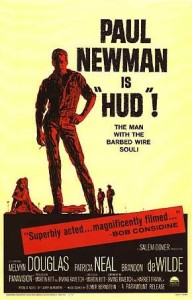Hud (1963)
Paramount Pictures
Director: Martin Ritt
Main Cast: Paul Newman, Patricia Neal, Melvyn Douglas, Brandon De Wilde
One of those rare times Hollywood delivers a movie worth watching. This might be seen as an early warning shot of the “New Hollywood” movement. The drama involves an old fool rancher (Melvyn Douglas) in a state of desperate denial, clinging to old values as the world changes around him. He disavows his sanctimonious nature, which forces his son Hud (Paul Newman) to become everything that Douglas’ character hates. On Turner Classic Movies, Robert Osborne describes it as Douglas’ morality vs. Newman’s amorality. That seems like a ridiculous view. Newman has morality, of a kind, it is just antithetical to everything Douglas’ character stands for. Hud is a womanizing drunkard, and hardly a conventionally likable character. But he’s a character true to his circumstances. He highlights how Douglas’ character denies his oppressiveness and closed-mindedness, by revealing how Hud sees no other option to preserve his dignity. On the surface, Hud creates problems, but as the movie progresses, he comes across as someone fighting back — perhaps in a futile, excessive way, but fighting back nonetheless. The cruelty of the human characters is underscored by the casual animal cruelty on the ranch. Everybody leaves Hud in the end, but that suits him just fine. The ending is kind of fitting. Hud wins out. He gets no real satisfaction in it though.
This is just a really well-made film too. There is music in the film, but usually the stark black & white cinematography speaks for itself. Much of the music comes from characters turning on a radio or jukebox. Of course there is great acting throughout. Osborne called Patricia Neal’s performance one of the best of the decade and he’ll get no major argument here even for such a bold claim. And this might be Newman at his very best. He throws all the charisma he can behind a character that seems to deserve none of it, and that underscores the tensions and contradictions of the character’s situation eloquently.

